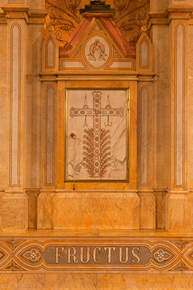 The tabernacle above the high altar. The tabernacle above the high altar. Sean C. Kim St. Mary’s Episcopal Church 25 December 2020 There’s been quite a shift from last night to this morning. Last night, our gaze was focused on a baby lying in a stable in the little town of Bethlehem. This morning, we behold a grand cosmic vision – the creation of the world by the Word of God, the Logos. Yet both scenes are about the same person – Jesus Christ. He is both the vulnerable little infant born to Mary and the all-mighty author and sustainer of the universe. In the mystery of the Incarnation, the divine and human come together. A lot of ink has been spilled over interpreting what we’ve just read in the Gospel of John. The fact that among the Four Gospels, it’s the only one that is given a fancy title, the Prolegomena or the Prologue, should give us some idea of how theologically significant it is. During the Seasons of Advent and Christmas at St. Mary’s, we conclude every Daily Mass with the reading of the Prologue. The idea that Jesus is the Word of God, the Logos, is not easy to understand. As one biblical scholar defines it, the Logos is “the logic that permeates and structures the universe, the divine reason that orders and gives meaning to all that is.”[1] Try explaining that at a cocktail party. We’re dealing with abstract Greek philosophy here. But, the fact is, we don’t have to understand the complex meaning behind the Logos to know God. Our faith is not based on grasping the nature of the divine reason or logic behind the universe. We can leave that to the theologians. Our Christian faith rests on the statement at the end of today’s reading: “And the Word became flesh and lived among us” (John 1:14). When we come to this sentence in praying the Angelus, we genuflect to express our deep reverence. In Jesus Christ, God became human. The Word became flesh. God became one of us and entered our world. Hence, God is not just an abstract, transcendent concept – someone up there beyond our comprehension. We can now know God through Jesus. Later in the Gospel of John, we find Jesus telling his disciples: “If you know me, you will know my Father also. From now on you do know him and have seen him” (John 14:7). Jesus is the incarnation and revelation of God. John, like the other Gospels, is an account of how Jesus, the Word made flesh, lived among the people of Palestine two thousand years ago. The Gospels describe and explain how Jesus revealed God through his teachings and ministry. After his death and resurrection, Jesus ascended into heaven, and we wait for his coming in glory and power at the end of time. But we also believe that the body of Jesus continues to be present here on earth. The Incarnation was not a one-time event that ended two thousand years ago. It is ongoing. Jesus lives among us. To go back to the statement “And the Word became flesh and lived among us,” the term that we translate as “live” is in the Greek actually “tabernacle” or “tent.” So a more literal translation would be “And the Word became flesh and tabernacled among us” or “pitched a tent among us.” Interestingly, we use the word tabernacle to refer to the box that contains the reserved host, the Body of Christ. So Jesus Christ, the Word made flesh, is present with us now in the tabernacle, and he will be present as we come up for Holy Eucharist. In the bread and wine of Communion, Christ will come to us in flesh and blood. One of my favorite Christmas carols is “God Rest Ye, Merry Gentlemen.” I just heard it on the radio this morning on my drive from home to church. I have come to especially appreciate the refrain: “Oh, tidings of comfort and joy.” I know that I am not alone in having experienced loss during the Season of Christmas. My mother died eight years ago around this time of the year. This season has never been the same since. But when I sing or hear this carol, I am reminded that Jesus came to give us comfort and joy. That thought consoles me and lifts my spirits. This year Christmas is not the same for any of us. COVID has wreaked havoc in our lives. We have all suffered losses. Yet, Christmas reminds us that God is not deaf to our cries of pain and suffering. In Jesus Christ, God became one of us to share our human lot and to give us hope and strength. This year, not all of us will be able to find comfort and joy in the presence of our family and friends. But we can all find comfort and joy in the presence of Jesus Christ, God Incarnate, who comes to us today as a baby in the manger and in the bread and wine of Holy Communion. Merry Christmas! [1] Judith Jones, “Commentary on John 1:1-14,” Working Preacher. Leave a Reply. |
The sermons preached at St. Mary's Episcopal Church, Kansas City, are posted here!
Archives
July 2024
Categories
All
|
To the Glory of God and in honor of the Blessed Virgin Mary
Address1307 Holmes Street
Kansas City, Missouri 64106 |
Telephone |
|
 RSS Feed
RSS Feed